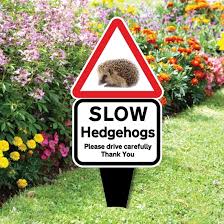Life has been getting in the way a bit recently, with both birding and blogging having to take a backseat for me at the moment. So, here is a guest post, written by the proper published author in the Warwick 100 team - Rick Thompson.
Rick has written two wonderful books and has another in the pipeline. The new book - 'A Year on the Fosse' - will explore the wildlife, history and folklore of the great Roman Road that runs straight through the heart of England between Exeter and Lincoln. Rick has kindly allowed us a sneaky peak of an extract, taken from the book, about roadkill (a sad but common sight along the Fosse Way). Wild creatures are killed on our busy roads in astonishing numbers. But while vehicles are fatal for some birds and animals, the victims are an important food source for our scavengers. Read on to find out more from Rick...
Roadkill
Unfortunately, along this stretch of the Fosse Way there are quite a few bodies. Dead badgers are at the side of the road every few miles it seems, along with foxes and the occasional deer. Most have been struck by vehicles at night. I have hit a badger in my car in the dark. It dropped down from the verge into my headlights and 'bang', instant death for the poor badger and a large insurance claim for me to repair the front of the car. What it must be like to hit a deer I can't imagine. September and October are the main months for the deaths of wild animals on our roads, apparently because young animals are exploring to find their own territories. In recent years, roads have had a major impact on our wildlife. The 'Road Lab', a team of researchers at Cardiff University, has been studying roadkill for some years. The researchers have been collating 'citizen science data' sent in by members of the public, to understand the relationship between roads and wildlife.
In 1951 there were 4.2 million vehicles on the UK's roads. In 2021 there were 39.2 million vehicles registered with the DVLA. So it's hardy surprising that collisions with motor vehicles are the biggest cause of mortality for badgers, (50,000 per year), hedgehogs (up to 300,000 per year) and pheasants (an estimated 6 million annually). So far the Road Lab has received 90,000 roadkill records. It seems the autumn months are particularly dangerous for grey squirrels and muntjac deer. But the predators and scavengers have certainly benefitted for this perpetual slaughter. The large amount of roadkill is one of the main reasons for the increase in buzzards and ravens across the country, and the success of the red kite introduction project.
A fair number of humans also eat roadkill. Arthur Boyt from Cornwall was the subject of TV documentary which featured him casseroling badger and poaching a polecat. He died in 2023 at the age of 83 – not from food poisoning. He had cancer. The chef, Sean Rowe has a popular Facebook site where he shows how to make roasts and pies from animals or birds found on the road, and a blog with advice on what to pick up and what to leave alone. It's all pretty obvious really. If it looks diseased or has been partly eaten, leave it. And he says by far the most important thing is to cook it thoroughly. But is it legal to pick up roadkill? There seems to be some misunderstanding about that. Here's the relevant part of the Wildlife and Countryside Act.
(e) uses any mechanically propelled
vehicle in immediate pursuit of any such wild animal for the purpose of
driving, killing or taking that animal ... he shall be guilty of an
offence.
Sean Rowe says it seems to him that accidental collision does not apply. A dead animal in the road is the property of the landowner, in most cases this will be the local council, and there is almost no objection from councils to people removing dead creatures. The blog emphasises that you must not stop to pick up something if there is any danger to other road users or yourself. My brother-in-law occasionally picked up freshly killed pheasants. He served roast pheasant to his mother-in-law, and warned her to watch out for any lead shot. A little joke that he enjoyed.
….................
'A
Year on the Fosse' should be published before Christmas. Rick Thompson.

